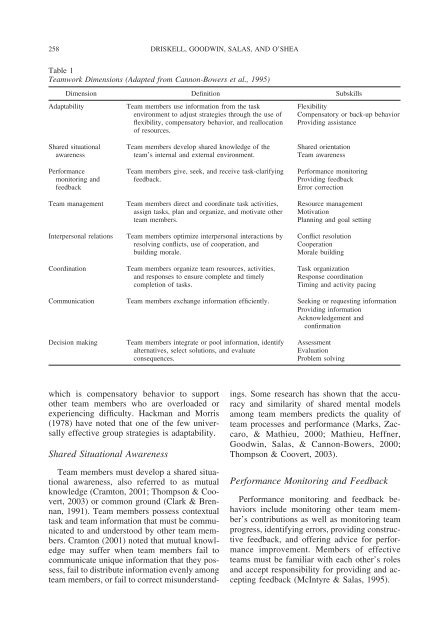258 DRISKELL, GOODWIN, SALAS, AND O’SHEATable 1Teamwork Dimensions (Adapted from Cannon-Bowers et al., 1995)Dimension Definition SubskillsAdaptabilityTeam members use information from the taskenvironment to adjust strategies through the use offlexibility, compensatory behavior, <strong>and</strong> reallocationof resources.FlexibilityCompensatory or back-up behaviorProviding assistanceShared situationalawarenessPerformancemonitoring <strong>and</strong>feedbackTeam managementInterpersonal relationsCoordinationTeam members develop shared knowledge of the<strong>team</strong>’s internal <strong>and</strong> external environment.Team members give, seek, <strong>and</strong> receive task-clarifyingfeedback.Team members direct <strong>and</strong> coordinate task activities,assign tasks, plan <strong>and</strong> organize, <strong>and</strong> motivate other<strong>team</strong> members.Team members optimize interpersonal interactions byresolving conflicts, use of cooperation, <strong>and</strong>building morale.Team members organize <strong>team</strong> resources, activities,<strong>and</strong> responses to ensure complete <strong>and</strong> timelycompletion of tasks.Shared orientationTeam awarenessPerformance monitoringProviding feedbackError correctionResource managementMotivationPlanning <strong>and</strong> goal settingConflict resolutionCooperationMorale buildingTask organizationResponse coordinationTiming <strong>and</strong> activity pacingCommunication Team members exchange information efficiently. Seeking or requesting informationProviding informationAcknowledgement <strong>and</strong>confirmationDecision makingTeam members integrate or pool information, identifyalternatives, select solutions, <strong>and</strong> evaluateconsequences.AssessmentEvaluationProblem solvingwhich is compensatory behavior to supportother <strong>team</strong> members who are overloaded orexperiencing difficulty. Hackman <strong>and</strong> Morris(1978) have noted that one of the few universallyeffective group strategies is adaptability.Shared Situational AwarenessTeam members must develop a shared situationalawareness, also referred to as mutualknowledge (Cramton, 2001; Thompson & Coovert,2003) or common ground (Clark & Brennan,1991). Team members possess contextualtask <strong>and</strong> <strong>team</strong> information that must be communicatedto <strong>and</strong> understood by other <strong>team</strong> members.Cramton (2001) noted that mutual knowledgemay suffer when <strong>team</strong> members fail tocommunicate unique information that they possess,fail to distribute information evenly among<strong>team</strong> members, or fail to correct misunderst<strong>and</strong>ings.Some research has shown that the accuracy<strong>and</strong> similarity of shared mental modelsamong <strong>team</strong> members predicts the quality of<strong>team</strong> processes <strong>and</strong> performance (Marks, Zaccaro,& Mathieu, 2000; Mathieu, Heffner,Goodwin, Salas, & Cannon-Bowers, 2000;Thompson & Coovert, 2003).Performance Monitoring <strong>and</strong> FeedbackPerformance monitoring <strong>and</strong> feedback behaviorsinclude monitoring other <strong>team</strong> member’scontributions as well as monitoring <strong>team</strong>progress, identifying errors, providing constructivefeedback, <strong>and</strong> offering advice for performanceimprovement. Members of effective<strong>team</strong>s must be familiar with each other’s roles<strong>and</strong> accept responsibility for providing <strong>and</strong> acceptingfeedback (McIntyre & Salas, 1995).
PERSONALITY AND TEAM EFFECTIVENESS259Team ManagementTeam management behaviors include directing<strong>and</strong> coordinating the task activities of other<strong>team</strong> members, assigning tasks, <strong>and</strong> motivatingother <strong>team</strong> members. These are primarily taskbehaviors oriented toward instrumental goals.One critical management task, planning, is oftenoverlooked in <strong>team</strong>s (Hackman & Morris,1978), although research has clearly demonstratedthe value of planning (Janicik & Bartel,2003; Weingart, 1992) <strong>and</strong> pretask briefings(Marks et al., 2000) to <strong>team</strong> performance.Interpersonal RelationsTeam members optimize interpersonal relationsby resolving conflicts, encouraging cooperativebehavior, <strong>and</strong> building <strong>team</strong> morale.These are primarily socioemotional behaviorsoriented toward smooth interpersonal relations.McIntyre <strong>and</strong> Salas (1995) noted that positive orsupporting <strong>team</strong> behaviors are not always apparentin <strong>team</strong> interactions—tasks dem<strong>and</strong>smay require terse, formal communications attimes—but that a positive <strong>team</strong> environmentsupports these task activities. Moreover, researchhas shown that cohesive groups tend toagree more readily (Lott & Lott, 1961), reportgreater satisfaction with the group (Curtis &Miller, 1986), <strong>and</strong> in general outperform lesscohesive groups (Mullen & Copper, 1994).CoordinationIn one of the earliest studies of group performance,Shaw (1932) attributed the <strong>effectiveness</strong>of groups to the capability of group members toexchange <strong>and</strong> coordinate information. Janicik<strong>and</strong> Bartel (2003) noted that effective coordination,knowing who is going to do what, when,<strong>and</strong> with whom, is critical to <strong>team</strong> performance.Behaviors that support effective coordinationinclude matching <strong>team</strong> member resources totask requirements, regulating the pace of <strong>team</strong>activities, <strong>and</strong> coordinating the response <strong>and</strong>sequencing of <strong>team</strong> member activities (Fleishman& Zaccaro, 1992).CommunicationCommunication is the primary vehiclethrough which task groups accomplish theirgoals (Marks et al., 2000). Team members mustexchange ideas <strong>and</strong> information in a clear <strong>and</strong>timely manner. Research suggests that effective<strong>team</strong> performance is related to the quantity <strong>and</strong>quality of communications—effective <strong>team</strong>scommunicate more <strong>and</strong> better than less effective<strong>team</strong>s (Foushee, 1982; Kanki, Lozito, &Foushee, 1989; Marks et al., 2000). Effectivecommunication behaviors include exchanginginformation in a timely manner, acknowledgmentof information, double-checking that theintent of messages was received (closed-loopcommunication), clarifying ambiguity, <strong>and</strong> theappropriate use of verbal <strong>and</strong> nonverbal cues(Kanki & Smith, 2001; Stout, Salas, & Fowlkes,1997).Decision MakingTeam decision making involves problemidentification <strong>and</strong> assessment, information exchange,generation <strong>and</strong> evaluation of solutions,implementation, <strong>and</strong> evaluation of consequences(Forsyth, 1990; Hirokawa, 1980). Barriersto effective <strong>team</strong> decision making mayinclude failure to adequately assess problems(Morel<strong>and</strong> & Levine, 1992), failure to considerothers’ input (Driskell & Salas, 1992), failure todisclose uniquely held information (Stasser &Titus, 1995), <strong>and</strong> undue influence from a single<strong>team</strong> member (Foushee & Helmreich, 1988).PredictionsThe preceding classification of core <strong>team</strong>workdimensions allows us to take the next stepin linking <strong>team</strong> member personality <strong>and</strong> <strong>team</strong>requirements. In the following, we predict theeffects of the specific personality facets definedin Figure 1 on specific core <strong>team</strong>work dimensions.These predictions are summarized in Table2. Note that when we are able to make astrong positive or negative prediction based oneither existing research or on a logical extensionof existing research, these predictions aremarked as “” or “–” respectively. In othercases, we feel that the relationship between aparticular <strong>team</strong> member facet <strong>and</strong> a specific<strong>team</strong>work dimension is weaker or unsupported,<strong>and</strong> thus we note these predictions as intermediate<strong>and</strong> indicated as “”.
- Page 2 and 3: 250 DRISKELL, GOODWIN, SALAS, AND O
- Page 6 and 7: 254 DRISKELL, GOODWIN, SALAS, AND O
- Page 8 and 9: 256 DRISKELL, GOODWIN, SALAS, AND O
- Page 12 and 13: 260 DRISKELL, GOODWIN, SALAS, AND O
- Page 14 and 15: 262 DRISKELL, GOODWIN, SALAS, AND O
- Page 16 and 17: 264 DRISKELL, GOODWIN, SALAS, AND O
- Page 18 and 19: 266 DRISKELL, GOODWIN, SALAS, AND O
- Page 20 and 21: 268 DRISKELL, GOODWIN, SALAS, AND O
- Page 22 and 23: 270 DRISKELL, GOODWIN, SALAS, AND O










